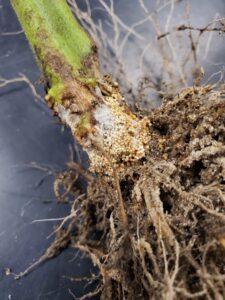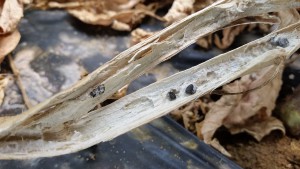There have been a few reports of Southern blight (Sclerotinia rolfsii) and White mold (Sclerotinia sclerotiorum) on tomato and pepper in New Jersey. Southern blight is much more common in vegetable areas south of the state where summer temperatures remain hotter (above 90°F) for longer periods of time. Like white mold, it can survive in the soil for many years. Symptoms of Southern blight include infection at the base of the stem at the soil line. The resulting infection will girdle the plant causing wilt and death. The fungus will produce white, cottony mycelium and very small, spherical sclerotia which are often have a tannish, brown color.
White mold is more common than Southern blight in New Jersey, and like Southern blight, once introduced into a field or high tunnel it can very difficult to control. The pathogen produces large black sclerotia on the surface and inside infected stems. If sclerotia of either pathogen make their way back into the soil, both can survive for years causing significant problems.
All infected plants need to be removed immediately and disposed of properly to help reduce the chances of sclerotia returning to the soil.
For more information on chemical control please see the 2024/2025 mid-Atlantic Commercial Vegetable Production Recommendations Guide.

Symptoms of Southern blight on infected pepper plant. Note the numerous, small white to tan colored sclerotia on the stem.

White mold of tomato. Note the large black sclerotia developing inside the brittle stems.
